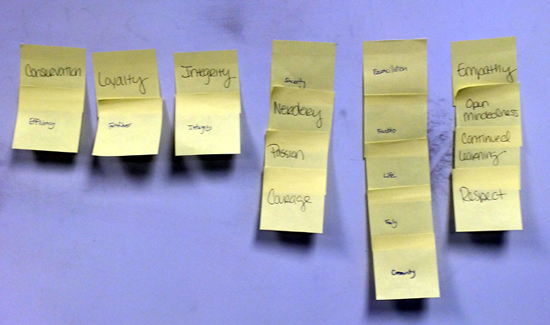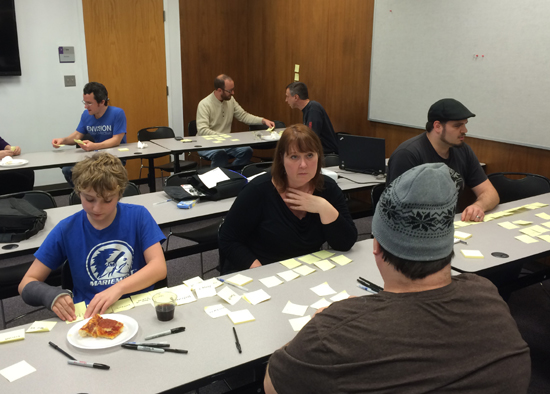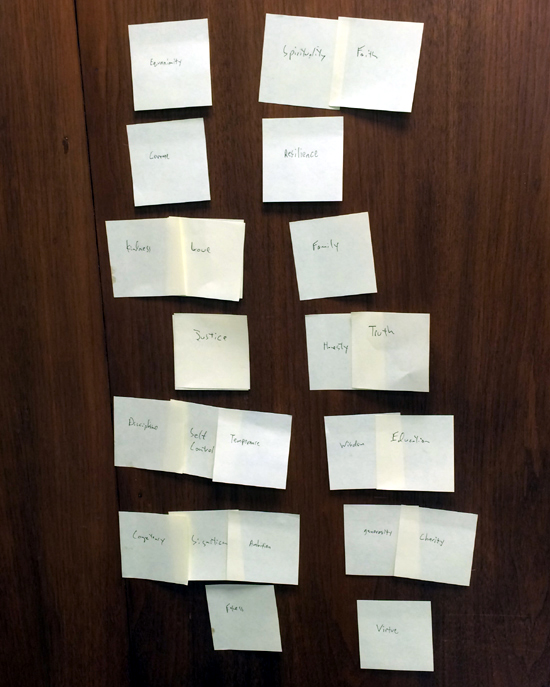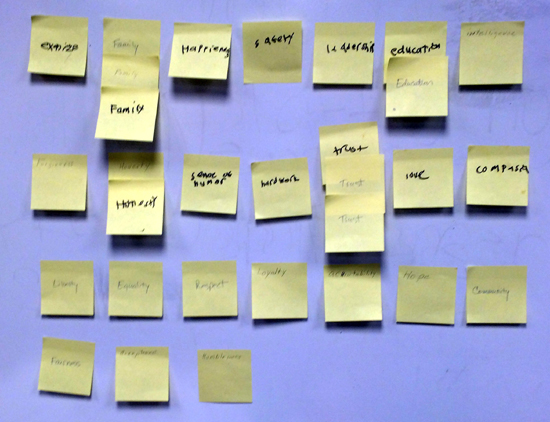A Christmas story: Christians and atheists talk about values
Over the summer, I had a great conversation with an evangelical pastor about values that led to an experiment in trust.
A couple weeks ago, a group of us that have been kicking around some interfaith ideas decided to try this experiment. One of the things we talked about as a group was getting past some of the stereotypes that are thrown around so often about atheists and Christians.
From the Christian side, an example often heard is that Christians are “stupid” for believing in a God. From the atheist side, an example is that atheists are “immoral” because they don’t believe in God. There’s others, but you get the idea.
Our goal with this experiment was simply to see if we could use this exercise to help break down and get past these stereotypes and walls.
If folks don’t know each other, before dividing people up into groups, have them introduce themselves. Here’s a quick slide I use for introductions:
Any introductory icebreaker would work though.
After introductions, introduce the exercise and the goal. The goal is simply to see what values the group has in common. While I’m explaining the exercise I show the following slide about values:
People may want to know a more precise definition of “values.” Don’t get overly caught up in definitions. A value is anything they want to put in their list. Because of the nature of the exercise, it’s really not necessary to define values any more specifically than the above slide.
I’ve found, however, that something like the above slide helps get people thinking and contributes to the success of the exercise. What you want is just enough to get people talking.
After explaining the goal and briefly touching on values, here’s the instructions:
Here’s the instructions with additional notes if you’re going to run this:
- Get Post-It notes for everyone involved. (In our case, I needed 9 sets of Post-Its since we had 4 groups of two and one minor who also wanted to participate and help out his mom.)
- Divide the group up into groups of 2 with one atheist/agnostic and one Christian per each group. You could also do groups of four with a 2/2 split; it would simply take a little longer. I would not recommend groups larger than this. Based on the group sizes, you probably want to limit the total number of people to no more than 24.
- Instruct each individual to take 10 minutes and write as many of your values as you can think of, one to a Post-It note.
- Don’t worry if you can’t think of everything. This is not a competitive exercise. It’s a collaborative exercise. If at any point during the collaboration, you think of something you forgot to write down, you can add it.
- After 10 minutes, have the groups build a shared values list.
- First, look at what you’ve both written down and combine all of the values that are the same. Have them move Post-Its from their individual lists to their shared list.
- Then, look at what you’ve each written down that might be different, but that you find is a value you also hold. So each individual looks at the other person’s list and if they feel they also share that value, they can move the Post-It to the shared list. Add all of these to the combined list of values.
- As people are looking at each other’s lists they can ask questions and/or talk about what they mean. You can also continue to add new Post-Its if you think of things you’ve forgotten.
- These are the values you share. Don’t dwell on any that are not in common.
- Have each group post their shared values list on a wall.
- After the shared lists are completed, have each group present their lists and what they talked about.
- Things to think about: How similar or different are your values?
After explaining the instructions and seeing that people understood, switch back to the slide about values so they can see this as they’re talking in pairs.
When we finished, we had four sets of shared values. With the permission of the group, I’m going to share them because it’s really interesting to see what people came up with.
Group 1:
- Equanimity
- Spirituality/Faith
- Courage
- Resilience
- Kindness/Love
- Family
- Justice
- Honesty/Truth
- Discipline/Self Control/Temperance
- Wisdom/Education
- Ambition
- Generosity/Charity
- Fitness
- Virtue
Group 2:
- Creativity
- Honesty
- Tact/Civility
- Integrity
- Achievement/Pursuit of Excellence/Success
- Completion
- Family
- Inclusion/Openness
- Community
- Humor
- Trust
- Friendship
- Pizza
- Circumspection
- Loyalty
- Learning/Study/Education
- Vulnerability
- Fitness
- Giving/Generosity
- Courage

Group 3
Group 3
- Conservation/Efficiency
- Loyalty/Faithfulness
- Integrity
- Sincerity
- Nerdery
- Passion
- Courage
- Reconciliation
- Family
- Life
- Friendship
- Community
- Empathy
- Open-mindedness
- Continued learning
- Respect
Group 4
- Exercise
- Family
- Happiness
- Leadership
- Education
- Intelligence
- Forgiveness
- Honesty
- Safety
- Sense of humor
- Trust
- Hard work
- Love
- Compassion
- Loyalty
- Equality
- Liberty
- Respect
- Accountability
- Hope
- Community
- Fairness
- Acceptance
- Humbleness
After everyone, posted their shared values on the wall, I had each group walk through their list and anything they discussed or realized. I’d ask a question or two and let other people ask questions as well.
While they were doing this, I posted the following slide.
It’s critical to let people share and discuss with the larger group.
Some of the things that came out of the discussion:
- Often people had different words for very similar concepts. For example, one group listed “faith/spirituality” as similar. This is perfectly ok. There are no wrong or right answers. Just shared answers. Definitions are totally up to the individual groups. The only rule in the exercise is that both people must agree on a value in order for it to be a shared value. If not, this doesn’t make it “wrong.” It’s just not a shared value.
- There really aren’t right or wrong answers. Just shared answers. It’s part of what makes the exercise so interesting.
 I was worried that our 12-year old would struggle so I asked him to help his mom. I shouldn’t have worried. He was the star of the show. He rattled off values that I never would have expected with ease: exercise, safety, family, happiness, leadership, education, sense of humor, trust, hard work, love, honesty, and compassion. I don’t think my list was good as his when I did it.
I was worried that our 12-year old would struggle so I asked him to help his mom. I shouldn’t have worried. He was the star of the show. He rattled off values that I never would have expected with ease: exercise, safety, family, happiness, leadership, education, sense of humor, trust, hard work, love, honesty, and compassion. I don’t think my list was good as his when I did it.- I didn’t ask, but the groups presented what they didn’t share as common values as well. This isn’t necessary to the exercise but our groups were ok with it and it just happened. To be honest, I can’t remember these though now I’m wishing I’d of written them down. If it helps great, my one caution would be to bring it back to the vast similarities if somehow it starts turning confrontational. Our group was fine. Everyone lived the values of openness and respect that they were talking about.
- The reason for focusing on shared values first is that everyone sees how much they have in common. And holy crap, was it a lot. This was my first time running the exercise in a group and it still surprised me the same way it did when I tried it with my evangelical friend. I feel this is where every group should start, yet how often do we start at a point of disagreement?
- After running this with the group, all I could think of was what a great group of people. Who wouldn’t want to get to know people with such strong values?
- The reason for running the exercise is a couple fold. One, to break down some of the more common stereotypes and help see each other as people regardless of beliefs about religion. And two, after you can see each other this way, it’s often possible to have some of the more difficult conversations without the animosity that sometimes we see in the public discourse.
- A great example is that we started talking about where our values came from until we ran out of time. The group felt, however, that this would be a great topic to explore in a future meeting.
Wrap
I share this freely as an exercise anyone can run. It’s my hope that evangelicals would be interested in running it with atheists or people of other faiths and that atheists would be interested in running it with people of faith or that people of different religious backgrounds would be interested in running it with each other.
If you would like the slide deck, don’t hesitate to contact me.
Happy Christmahannukwanzadan!
Cross posted at Daily Kos.
—
 |
David Akadjian is the author of The Little Book of Revolution: A Distributive Strategy for Democracy. Follow @akadjian |


















